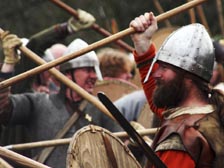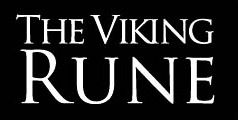 Professor Mark Jobling of Leicester University, who now seems to be the ultimate authority on Viking bloodlines in northern England within the national project to create a genetic map of the UK, has launched a new exciting study. Men whose fathers’ fathers were born in Cumbria, Lancashire, Cheshire, North Yorkshire, Durham or Northumberland are wanted to take part in it.
Professor Mark Jobling of Leicester University, who now seems to be the ultimate authority on Viking bloodlines in northern England within the national project to create a genetic map of the UK, has launched a new exciting study. Men whose fathers’ fathers were born in Cumbria, Lancashire, Cheshire, North Yorkshire, Durham or Northumberland are wanted to take part in it.
Special attention is paid to people with such local surnames as Borrowdale, Branthwaite, Haygarth, Oldcorn, Satterthwaite and Thornthwaite. However, all eligible volunteers will be sent DNA sample kits in order to determine if they have Viking heritage. Professor Jobling formulated the aim of the study as follows: “What we want to end up with is a map of the north of Britain showing where the Vikings were concentrated and distinguishing between the Norse Vikings who landed in the west and the Danish Vikings to the east.” The research associate Dr Turi King comments: “The East Midlands is a particularly important area as it formed the heartlands of the Anglo-Saxon kingdom of Mercia and large parts also fell within the area of the Danelaw, an area dominated Danish Vikings during the 9th and 10th centuries.”
How Vikings affected this area is evident in such placenames as Flimby, Birkby, Crosby, Allerby and Dovenby, but the effect on genetics thus far has been less clear. The initiative is part of The People of the British Isles project headed by Professor Sir Walter Bodmer at the University of Oxford. The recently launched research on Viking DNA in Northern England is funded by the Wellcome Trust and forms part of the grant “What’s in a name? Applying patrilineal surnames to forensics, population history, and genetic epidemiology.” It will help to discover the genetic impact of the Angles, Saxons and Vikings on present day Britain.
It is important that some of such genetic variation contributes to inherited differences in susceptibility to cancer and heart disease. The study will continue until late 2010, after which the results will be published.
Photo courtesy jriro2000. Used under the Creative Commons Attribution 2.0 Generic Licence.

Scientists have deciphered the DNA of the oldest Vikings and found that they are descendants of two different groups of people – people from Central Europe and inhabitants of the north of modern Russia and the Baltic States, who migrated to Scandinavia about 10 thousand years ago, according to an article published in the journal PLoS Biology.
“We discovered that 10 thousand years ago, when Scandinavia became warmer, two groups of migrants settled its territory. These migrations were repeated many times afterwards – at the end of the Stone Age, at the beginning of the Bronze Age and after the appearance of civilization. Modern Scandinavians have almost nothing in common with the first inhabitants of the peninsula,”said Mattias Jacobson from Uppsala University in Sweden.
As scientists believe today, the first people arrived in Europe about 45-40 thousand years ago, traveling in several ways – through the Balkans, the islands of the Mediterranean and moving along the coast of Africa towards Spain.
The first inhabitants of Europe, whose trace has almost completely disappeared from the DNA of modern Europeans, settled almost all of its northern regions, including Britain, the north of Russia and Scandinavia – which earlier were covered with ice and not suitable for life. It was only 17-15 thousand years ago, with a warmer climate, the north became accessible to its first inhabitants.
Jacobson and his colleagues have deciphered the DNA of the first inhabitants of Scandinavia, whose remains were buried on the western coast of Norway, on the island of Gotland in the Baltic Sea and in the Stura-Carlsø reserve about 6-9 thousand years ago.
I have been research my very close relatives surname Svärd, which I believe is the surname of a direct descendant of Ragnar loftbrok.
I was told by my father that my great grandmother was the last known desendent from Rollo. Her name was Lydia Whitehead. I would love to find out if I am a desendent from him. To have viking DNA! How can I please go about finding out.
That’s really cool, I may be related to Ragnar Loftbrok who was the brother of Rollo, so we may have some of the same relatives far back.
And btw if u are interested about vikings read about the Name Russia as u all know,, It was founded by Swedish vikings and ukraine was a stronghold,
Russia means men from Rus ( how rows ), and Rus is a place in Sweden ( Roslagen ) and Rurik is Viking ,,, there is sooo much more than England
I´m a Swede and have some genes (real ) , genes doesn´t make u viking… ur inner call awakens u ,, is are u still christian yes u are, i´m pagan left church.. Maybe some genes in u are from the old norse,, but sowhat !!
I cannot even call me viking, they were much above this.. I have all my life been study and follow my heritage
You say you’re not worthy of being a Viking and at the same time say you’re pagan!! True! What on earth do you think could change the minds of real Vikings who had worshiped pagan false gods their whole lives in community to completely abolish them and worship a new God? The truth!! They saw it with their own eyes.
Just because there are other gods doesn’t make them into false gods, as far as we actually know, there is no afterlife and your god is just as false as theirs.
I’m a Norse Pagan, my younger sister makes fun of me for it. I believe anybody can worship any religion, doesn’t make them right or wrong. They have different beliefs.
Rod
My haplogroup was determined by 23andMe and I’m not sure that this company provides markers. I have found another family of Leaches that came to North Carolina in the late 1700s from Kilmartin and who’s haplogroup is the same as mine (N1c1). His name was Malcohm Leach b. 1755. I have found his markers and assume mine would be the same, our shared haplogroup is so very rare in Scotland. Which testing company
would you recommend to get a proper assessment?
James
I’ve just become aware of this article in 2016. My mother’s father was John Haygarth, who father immigrated to Victoria, Australia from Liverpool in mid-late 19th century. Where can I find the results of this study?
Have the Viking-Rus lines been analyzed from Lake Ladoga, to Novgorod, to Kiev, to the Black Sea? Rurikids?
So neat. I am told of McLeod and my French ancerstory from Normandy France. Leod was son of Olaf the black, a Viking king of Scottish isles. I am told I look to be a sheildmaiden haha. But honestly I wish I lived amongst others like me. I am spiritually inclined and drawn to the moons everchanginf phases. I wonder I its because of my DNA….
Hello,
I have had my DNA sampled and analysed by ScotlandsDNA. The results state that my Fatherline is Norse Viking.
I have researching my family tree and so far identified ancestors in 1750 from Ayrshire, Scotland. I have the DNA results to share, if wanted.
Regards,
Thank you for offering to share your Viking DNA information. I was likewise surprised to find that my DNA is not common Scotland or the rest of the United Kingdom even though my recent ancestors settled among the Scottish clans that came to the Cape Fear area of the Carolinas. My paternal haplogroup was found to be N1c1.
we – several families of different surnames – are looking into the possibilities of Norse Viking history; the common marker is R-S21607 which is also the facebook page name where we are beginning to exchange info.
Can you let us know your DNA markers?
Rod